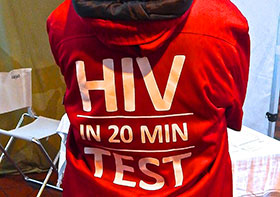HIV/AIDS epidemic in Europe: progress on testing and counselling

WHO/James Hammond
Knowing that one is infected with HIV is a prerequisite for accessing HIV treatment and care. Testing strengthens preventive efforts, encourages infected people to avoid transmission to others and motivates other people to avoid becoming infected. Rapid testing and community-based testing are well accepted and widespread in the western part of the WHO European Region, but remain a challenge in the east.
In September, WHO/Europe will report on progress in implementing the European Action Plan for HIV/AIDS 2012–2015. Each month until then, we highlight a specific area of the action plan – beginning with HIV testing and counselling.
Progress in HIV testing and counselling
Since 2011, HIV testing and counselling have been increasingly available, accessible and affordable in the European Region, in both health care settings and the community. Quality and ethical standards, however, vary between countries. While at least 50 million people in the Region were tested for HIV in 2012, this does not reflect better coverage of those most in need of testing. Only up to 53% of key populations at higher risk of HIV are tested, well below the European target for 2015 of 90%. In addition, there has been no increase in earlier diagnosis since 2010: 50% of people newly diagnosed with HIV were tested late.
WHO/Europe supports Member States’ efforts to expand access to and increase early uptake of HIV testing and counselling, paying particular attention to the needs of the most vulnerable. For example, WHO/Europe published a policy framework for scaling up HIV testing and counselling in the Region (2010), supported initiatives such as the European Union European HIV testing week (2013) and the pan-European HIV in Europe (2012–2103), and provides technical assistance to Member States.
Progress report for 2014 Regional Committee
The 2011 WHO Regional Committee for Europe adopted the European Action Plan for HIV/AIDS 2012–2015 and requested the WHO Regional Director for Europe to report on implementation to its 2014 session. The report to the Regional Committee will describe the progress made and challenges remaining.
“I became a volunteer for HIV testing and counselling because I am driven by my passion for public health and human rights. I want to reach out, help people.”
– volunteer, Danish AIDS Foundation



